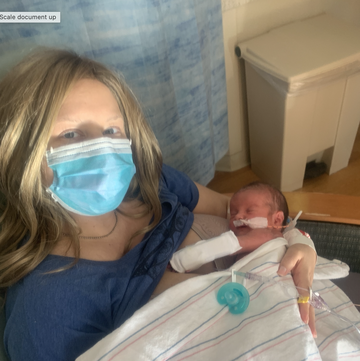The Only Guide to Morning Sickness You’ll Need


Table of Contents
When does morning sickness start, when to call your doctor, morning sickness & your mental health, how to feel better (or at least less bad).
I’ll never forget Thanksgiving 2016. While I lay in a miserable heap on the living room floor, eight of my friends talked and laughed over a table full of potluck offerings. We all assumed I had just had too much to eat, or maybe some dairy accidentally slipped into one of the dishes. Four days later, I found out I was pregnant.
My entire first trimester , I struggled with persistent nausea, zero appetite, and extreme fatigue. Looking back, I now realize I was woefully unprepared for all the physical and emotional effects that morning sickness would have on my life. I had no idea during that Thanksgiving that it would be the first of many events that I would miss out on over the coming months.
Easily one of the most well-known symptoms of pregnancy , morning sickness is often one of the earliest and most anticipated signs that a baby is in your future. While you probably have a good idea about how it can affect your body—nausea, vomiting, food aversions, all the stuff you usually hear about when it comes to morning sickness—what might take you by surprise is how it can also affect your mental health.
There are a lot of different ways morning sickness can show up, from when it starts to how long it lasts to the severity of your symptoms. That means there are also a lot of ways it can affect your day-to-day life and your overall feelings about your pregnancy.
Whether you're thinking about one day having a baby and are just curious, newly pregnant and worried about developing symptoms, or already deep in your morning sickness journey, here's everything you need to know about how this not-so-fun hallmark of the first trimester can make you feel, inside and out.
As a telltale sign of early pregnancy, morning sickness is often one of the first noticeable symptoms that something is going on in there. It usually shows up around week six, but every pregnancy is different—you might not start feeling nauseous until later in your first trimester, or you may feel queasy before you've even taken a pregnancy test .
Regardless of when it starts, normal morning sickness symptoms fade by the end of the first trimester, right around week 12 or 13 (though in some rare cases, about 3% of pregnancies, it can last until delivery day). This symptom is also a bit of a trickster—while it may be called morning sickness, don't be surprised if you end up feeling nauseous all day and all night, or any time you're around food and/or strong smells.
It’s also important to note that morning sickness itself isn't just one thing; it consists of three symptoms : nausea, vomiting, and food aversions. You may experience just one or two of them, or you may end up feeling all three. The intensity can also vary pretty widely—your morning sickness might feel like slight queasiness during weeks six through eight, or you might spend 80% of your first trimester hugging the toilet and refusing everything except water and Saltines (and even those are iffy).
While it might be one of the more talked about symptoms of early pregnancy, morning sickness isn't a sure thing— about 30% of pregnant women never feel it . It’s easy for those who've been through these symptoms to consider that 30% of the pregnant population the lucky ones. But if you’re a member of this group, you may not feel the same way. In fact, for some people, not experiencing one of pregnancy's most (in)famous symptoms might make you feel like you're missing out. Rest assured, your pregnancy is just as valid and real as someone who spends the first couple months in a mad dash to the bathroom.
While morning sickness is relatively common, there is a point where it can become too intense. It's totally normal for morning sickness to be uncomfortable and inconvenient, but it's not normal if you're vomiting to the point of severe dehydration (causing overwhelming fatigue and/or fainting), if you can't keep any food down, if you're losing weight, or if your symptoms last well beyond the first trimester.
These more extreme symptoms are classified as hyperemesis gravidarum, or HG, which quite literally means "excessive vomiting." HG is a severe version of morning sickness that can sometimes require special medical treatment, including prescription anti-nausea medicine and hospitalization to replenish fluids.
HG can be debilitating and even a little bit scary, but as long as you get the medical treatment you need, it's unlikely that there will be any long term effects, says Dr. Michael Green, ob-gyn, co-founder of women's telehealth company Winona and founder of YouTube channel Medtwice .
It's well known that morning sickness can affect your physical health. But what isn’t talked about enough is the role morning sickness can play in your mental health.
When I was pregnant with my first kid, morning sickness hit me hard. I was nauseous literally all the time, I could only keep down Ritz crackers, ginger ale, and peppermint gum, and I lost 15 pounds in just two months. But all those physical symptoms weren't the worst part—it was the fact that they kept me couch-ridden.
While all my family and friends were out living their lives, throwing dinner parties, going on hikes, and seeing concerts, I was stuck on the couch feeling absolutely miserable. I declined so many invitations during those few months and I missed out on memorable occasions with my loved ones.
It was easily the most isolating time of my pregnancy, especially since I was the first out of my group of friends to be pregnant. None of them really understood how miserable I felt. And seeing everyone's Instagram posts of all the events I was missing made it so much worse. Despite having some visitors and well-meaning attempts to make me feel included, I was constantly grappling with loneliness, which led to a depression that lasted the vast majority of my pregnancy.
Even if you're feeling well enough to participate in social activities, morning sickness can still be really disruptive to your overall mood, and it can sour your perspective on your pregnancy.
"It robbed a lot of the joy of my first pregnancy because I felt like all I wanted to do was lay on the cold tile floor and try not to barf," says Alyssa, a mom of two in Los Angeles. "I also felt like I missed out on a lot of the fun stereotypical cravings and ate a lot of crackers, bread, and noodles, but not in a 'whee, carbs' way."
Morning sickness can make you question why pregnancy is so often seen as a beautiful and joyous occasion—especially if it's your first time going through it. You might wonder why no one ever told you it could feel so bad. And it's totally understandable to have feelings of envy and isolation as you see other people having an easier time with their pregnancies—you're not having the pregnancy experience you dreamed of.
Looking back on my first pregnancy (now seven years on the other end of it), I think the thing that helped me the most was having well-meaning friends and family who showed up for me. For three solid months, even through my sour moods and even sour-er stomach, my pregnancy support system was always there with crackers stashed in their bags and mint gum at the ready. The only thing that could have made my morning sickness experience even easier—and what I now give to friends who are going through it—is the assurance that it would, in fact, eventually end.
There is some good news, though. Thousands of years of pregnancy, morning sickness, and science means there are quite a few tried-and-true methods for relieving the worst of it.
Here are some things you can try to make this phase more manageable and to start to feel more like yourself again:
Stay hydrated: Dehydration can make nausea worse, so try to sip water throughout the day. And if your stomach can handle it, try adding electrolyte drinks to replace minerals you may have lost due to vomiting. You can also stay hydrated with tea, and flavors like ginger and peppermint have the added bonus of helping to reduce nausea. Dr. Green also recommends eating ice chips if you're having an aversion to drinking liquids.
Eat small, frequent meals: Instead of large meals, Dr. Green suggests opting for smaller, more frequent nutrient-dense snacks to keep your stomach from becoming too empty or too full, which can make nausea worse.
Drink your meals: "Try eating foods that you can sip on like soups or smoothies," says Rachelle Mallik, a registered dietitian and founder of The Food Therapist . "Or if that's too much work, try pre-made nutrition or protein drinks." If you're going the protein drink route, Mallik notes that they may contain large amounts of added vitamins and minerals, which you may want to avoid if you're also taking a prenatal multivitamin . Talk with your doctor before adding any nutritional supplements to your diet.
Eat or drink ginger: "I’m a big advocate of ginger, a natural ingredient with anti-nausea and anti-inflammation properties," Dr. Green says. "Try ginger tea, ginger candies, or ginger capsules (with your doctor’s green light)."
Go cold: If you're having aversions to certain smells, try eating cold foods instead of hot foods. "Cold foods emit less odors so they can be easier to tolerate than hot foods," Mallik says.
Keep a bedside snack stash: Starting your day with an empty stomach can lead to worse nausea throughout the morning. Keep a stash of crackers or other plain, bland foods by your bed so you can take a few bites before getting up for the day. Having even a tiny amount of food in your stomach can help keep nausea at bay.
Avoid triggers: Identify and avoid smells or foods that trigger your nausea. Opt for bland, easily digestible foods, and keep your eating and cooking areas well-ventilated.
Rest: First-trimester fatigue is a common companion to morning sickness, and it can actually make nausea worse, Dr. Green says. He recommends getting adequate rest and taking short naps as needed during the day.
Acupressure bands: "There are wristbands designed for motion sickness now that might provide relief through acupressure," Dr. Green says. These bands apply pressure to specific points on the wrist, which may help reduce nausea.
While morning sickness can feel like a never-ending battle, these options can help alleviate the symptoms. When you feel at your worst, it's also important to remember that you're not alone; seeking support from healthcare professionals, friends, or online communities can provide valuable guidance and the reassurance you need to not feel isolated. Remember that this phase is temporary and that, even through the worst of morning sickness, your body is capable of incredible things.
That miserable Thanksgiving party that signaled the start of my first pregnancy is a distant memory for me now, but I’ll never forget the support and gentle care that got me through the bleary, nausea-filled first trimester. When morning sickness hit me all over again in my second pregnancy, I kept those memories at the front of my mind, remembering to be gentle with myself, especially in moments of isolation and loneliness. If you’re stuck on the floor, on the couch, in bed, or next to the toilet while everyone else seems to be living their lives, please be kind to yourself. Eat what you can, rest when you can, and remember that you’ll be back to normal eventually (with a baby to show for it).
Want evidence-based health & wellness advice for fertility, pregnancy, and postpartum delivered to your inbox?
Your privacy is important to us. By subscribing you agree to our Privacy Policy and Terms & Conditions . This site is protected by reCAPTCHA and the Google Privacy Policy and Terms of Service apply.
Amylia Ryan
Amylia Ryan is the associate editor at Babylist. She specializes in the topics of health, wellness, lifestyle products, and more.
Related Articles

What Does Having Placenta Previa Mean For Your Pregnancy?

Prenatal Physical Therapy

Your Guide to Pregnancy Hormones

Can You Jump Rope During Pregnancy?

Can You Use a Lidocaine Patch During Pregnancy?

Can You Eat Hot Cheetos During Pregnancy?

How Pregnancy Affects Your Pelvic Floor
Get the newsletter.
Evidence-based health and wellness resources for fertility, pregnancy and postpartum.
- Patient Care & Health Information
- Diseases & Conditions
- Morning sickness
Morning sickness is feeling like throwing up, also called nausea, and throwing up, also called vomiting, that occurs during pregnancy. Despite its name, morning sickness can strike at any time of the day or night.
Many people have morning sickness, especially during the first three months of pregnancy. But some people have morning sickness all through pregnancy. Home remedies, such as snacking during the day and sipping ginger ale or taking medicine you can buy without a prescription, might help relieve nausea.
Rarely, morning sickness is so bad that it turns into hyperemesis gravidarum. This is when the nausea and vomiting cause serious fluid loss or loss of more than 5% of pre-pregnancy body weight. Hyperemesis gravidarum might require going to a hospital for treatment.
Products & Services
- A Book: Mayo Clinic Guide to a Healthy Pregnancy
- A Book: Obstetricks
Nausea, with or without vomiting, is common in pregnancy. Morning sickness is often brought on by smelling certain odors or eating certain foods.
Morning sickness is most common during the first three months of pregnancy. It typically starts before nine weeks. Symptoms usually improve by the middle or end of the second three months of pregnancy.
When to see a doctor
Contact your health care provider if:
- You produce no urine or only a little urine that's a dark color
- You can't keep liquids down
- You feel dizzy or faint when you stand up
- Your heart races
There is a problem with information submitted for this request. Review/update the information highlighted below and resubmit the form.
From Mayo Clinic to your inbox
Sign up for free and stay up to date on research advancements, health tips, current health topics, and expertise on managing health. Click here for an email preview.
Error Email field is required
Error Include a valid email address
To provide you with the most relevant and helpful information, and understand which information is beneficial, we may combine your email and website usage information with other information we have about you. If you are a Mayo Clinic patient, this could include protected health information. If we combine this information with your protected health information, we will treat all of that information as protected health information and will only use or disclose that information as set forth in our notice of privacy practices. You may opt-out of email communications at any time by clicking on the unsubscribe link in the e-mail.
Thank you for subscribing!
You'll soon start receiving the latest Mayo Clinic health information you requested in your inbox.
Sorry something went wrong with your subscription
Please, try again in a couple of minutes
The cause of morning sickness is not known. Hormone changes might play a role. Rarely, a medical condition not related to pregnancy, such as thyroid or gallbladder disease, can cause serious nausea or vomiting.
Risk factors
Morning sickness can affect anyone who's pregnant, but it might be more likely for those who:
- Had nausea or vomiting from other causes before becoming pregnant, such as motion sickness or migraines
- Had morning sickness during a prior pregnancy
- Are pregnant with twins or other multiples
Hyperemesis gravidarum might be more likely for those who:
- Are pregnant with a girl
- Have a family history of hyperemesis gravidarum
- Have had hyperemesis gravidarum during an earlier pregnancy
Complications
Mild nausea and vomiting of pregnancy usually won't cause harm.
If left untreated, severe nausea and vomiting can cause a lack of bodily fluids, a condition known as dehydration. It also may lead to an imbalance in electrolytes — the salts in blood that control the balance of fluids in the body. Severe nausea and vomiting may result in less urine output. Research is mixed on whether hyperemesis gravidarum causes poor weight gain for the baby during pregnancy.
There's no sure way to prevent morning sickness. However, taking a daily vitamin supplement before and during pregnancy might help.
- American College of Obstetricians and Gynecologists (ACOG) Committee on Practice Bulletins — Obstetrics. ACOG Practice Bulletin No. 189: Nausea and vomiting of pregnancy. Obstetrics & Gynecology, 2018;131:e15.
- Frequently asked questions. Pregnancy FAQ126. Morning sickness: Nausea and vomiting of pregnancy. American College of Obstetricians and Gynecologists. https://www.acog.org/womens-health/faqs/morning-sickness-nausea-and-vomiting-of-pregnancy. Accessed Aug. 16, 2022.
- Smith JA, et al. Nausea and vomiting of pregnancy: Clinical findings and evaluation. https://www.uptodate.com/contents/search. Accessed Aug. 16, 2022.
- AskMayoExpert. Nausea and vomiting in pregnancy. Mayo Clinic; 2021.
- Smith JA, et al. Nausea and vomiting of pregnancy: Treatment and outcome. https://www.uptodate.com/contents/search. Accessed Aug. 16, 2022.
- Badowski S, et al. Cannabis use during pregnancy and postpartum. Canadian Family Physician. 2020; https://www-cfp-ca.mclibrary.idm.oclc.org/content/66/2/98. Accessed Aug. 16, 2022.
Associated Procedures
- Acupuncture
- Symptoms & causes
- Diagnosis & treatment
Mayo Clinic does not endorse companies or products. Advertising revenue supports our not-for-profit mission.
- Opportunities
Mayo Clinic Press
Check out these best-sellers and special offers on books and newsletters from Mayo Clinic Press .
- Mayo Clinic on Incontinence - Mayo Clinic Press Mayo Clinic on Incontinence
- The Essential Diabetes Book - Mayo Clinic Press The Essential Diabetes Book
- Mayo Clinic on Hearing and Balance - Mayo Clinic Press Mayo Clinic on Hearing and Balance
- FREE Mayo Clinic Diet Assessment - Mayo Clinic Press FREE Mayo Clinic Diet Assessment
- Mayo Clinic Health Letter - FREE book - Mayo Clinic Press Mayo Clinic Health Letter - FREE book
Your gift holds great power – donate today!
Make your tax-deductible gift and be a part of the cutting-edge research and care that's changing medicine.
- Type 2 Diabetes
- Heart Disease
- Digestive Health
- Multiple Sclerosis
- Diet & Nutrition
- Supplements
- Health Insurance
- Public Health
- Patient Rights
- Caregivers & Loved Ones
- End of Life Concerns
- Health News
- Thyroid Test Analyzer
- Doctor Discussion Guides
- Hemoglobin A1c Test Analyzer
- Lipid Test Analyzer
- Complete Blood Count (CBC) Analyzer
- What to Buy
- Editorial Process
- Meet Our Medical Expert Board
8 Morning Sickness Remedies for All-Day Relief
- When It Starts and Resolves
Morning sickness refers to the symptoms of nausea and vomiting often accompanying pregnancy . It’s estimated that up to 70% to 80% of pregnant people experience nausea and vomiting. It usually begins around four to six weeks after conception and often resolves after 20 weeks.
Causes of morning sickness are related to the physical changes associated with pregnancy, including changing hormone levels, an enhanced sense of smell, and gastric reflux .
This article discusses morning sickness remedies, including medications, supplements, and lifestyle changes.
Alex Potemkin / Getty Images
For most pregnant people, morning sickness symptoms occur early in the day. However, it can occur at any time of day, including overnight. Sometimes morning sickness lasts all day.
Ways to Ease Morning Sickness
Morning sickness is very common, but it can significantly impact your life. Fortunately, there are several remedies available to ease your symptoms.
Lifestyle Remedies
Small changes to your lifestyle may improve nausea and vomiting during pregnancy. Proven strategies to improve morning sickness include:
- Pace yourself throughout the day and try to avoid overextending yourself.
- Avoid smoke and strong odors.
- Practice stress management techniques.
- Focus on getting more sleep if possible.
Dietary Remedies
Many people with morning sickness struggle to eat a variety of healthy foods . Fortunately, there are dietary changes you can make to ease your symptoms.
Dietary changes to prevent nausea include:
- Eat a combination of bland proteins and carbohydrates. Try nut butter with crackers or yogurt with fresh fruit.
- Try to eat crackers or dry toast before getting up in the morning.
- Keep bland snacks on hand because hunger is a morning sickness trigger.
To ease morning sickness, avoid the following:
- Foods that are high in fat or salt
- Large meals
- Drinking a large amount of beverages with meals
Specific tastes or smells may trigger morning sickness. Learning and avoiding your triggers can help reduce the severity and frequency of nausea and vomiting.
Physical Activity
Staying physically active is important during pregnancy. Exercise may reduce feelings of nausea. It can also help with other pregnancy symptoms like constipation and achiness.
Focus on gentle activities and try not to overexert yourself. Avoid any time of day when your nausea and vomiting are the worst. Be sure to check with your healthcare provider before starting new activities.
Medications to reduce nausea and vomiting during pregnancy are available. Always talk with your healthcare provider before beginning a new medication.
Vitamin B6 has been proven to improve morning sickness at a dosage of 100 milligrams or less per day.
The Food and Drug Administration (FDA) has approved Diclegis (doxylamine succinate and pyridoxine hydrochloride) for morning sickness treatment.
People with severe morning sickness may require intravenous (IV) fluids to treat dehydration.
Prenatal Vitamins
Prenatal vitamins are large pills that may be difficult to take when nauseated. However, these vitamins are important for your and your baby's health. Starting prenatal vitamins before you become pregnant can also help prevent and or reduce symptoms during pregnancy.
To lower the risk of vomiting with your prenatal vitamins, try changing the way you take them:
- Try taking your prenatal vitamin at night if it causes stomach upset during the day.
- If your vitamin can be split in half, try taking half in the morning and half at night.
- Try different brands to see if one is better for your stomach.
Acupuncture/Acupressure
Acupuncture and acupressure are treatments used in traditional Chinese medicine. Acupuncture involves placing thin needles into the skin at specific points on the body. It may be helpful to treat nausea and manage morning sickness.
Acupressure uses wristbands to apply pressure on specific areas of your wrist. They are often used to treat motion sickness and can be helpful for morning sickness as well.
Herbal Remedies
Herbal remedies like ginger have been found to ease nausea and are safe for use during pregnancy. Look for them in the form of tea, as well as in supplements, candies, and ginger ale.
Staying hydrated is an important way to prevent dehydration and lower the chance of morning sickness. Being dehydrated can be a trigger for nausea. During pregnancy, your body needs eight to 12 glasses of water daily.
If drinking water is difficult when you’re already nauseated, try keeping a water bottle with you to take small sips throughout the day. Drinking a large amount of water in one sitting could upset your stomach.
Why Pregnancy Causes Nausea
Pregnancy causes several physical changes. During pregnancy, your hormone levels are changing. It is thought that these hormonal changes lead to nausea and vomiting.
People who are pregnant also have an enhanced sense of smell. This could lead to nausea from strong odors. Also, as your baby grows, the increased pressure on your stomach leads to gastric reflux . This causes stomach acid to travel back up the esophagus and may lead to heartburn and nausea.
Start and End of Morning Sickness
Fortunately, morning sickness does not usually last all of pregnancy. It often begins within weeks of missing their period, at about six to nine weeks of pregnancy, peaks between 10 and 16 weeks and usually resolves 20 weeks of pregnancy.
When to Call Your Healthcare Provider
Morning sickness is common, but it can become dangerous in extreme cases. Talk with your healthcare provider if you have been experiencing nausea and vomiting. It is especially important to seek care if you have any of the following:
- Uncontrolled vomiting
- Blood in the vomit
- Vomit that looks like coffee grounds
- Weight loss
Morning sickness describes the pregnancy symptom of nausea and vomiting. Morning sickness is very common and usually resolves after 20 weeks of pregnancy. Fortunately, several remedies can ease your symptoms.
Making changes to your diet, exercise routine, and lifestyle could help. Focus on small meals throughout the day, and be as physically active as possible. Stay hydrated throughout the day and try herbal remedies like ginger. If home remedies are ineffective, discuss medication options with your healthcare provider.
MedlinePlus. Morning sickness .
Lee NM, Saha S. Nausea and vomiting of pregnancy . Gastroenterol Clin North Am . 2011;40(2):309-vii. doi:10.1016/j.gtc.2011.03.009
American College of Obstetricians and Gynecologists. Morning sickness: Nausea and vomiting of pregnancy .
Tan PC, Kartik B, Thanendran P, Zakaria R, Win ST, Omar SZ. Taste, smell and food-related nausea and vomiting responses in hyperemesis gravidarum: A case-controlled study . Sci Rep . 2020 Mar 10;10(1):4445. doi:10.1038/s41598-020-61114-y
Quinlan JD, Hill DA. Nausea and vomiting of pregnancy . afp . 2003;68(1):121-128.
American College of Obstetricians and Gynecologists. Nausea and vomiting of pregnancy .
Matthews A, Haas DM, O'Mathúna DP, Dowswell T. Interventions for nausea and vomiting in early pregnancy . Cochrane Database of Systematic Reviews 2015, Issue 9. Art. No.: CD007575. doi:10.1002/14651858.CD007575.pub
Viljoen E, Visser J, Koen N, Musekiwa A. A systematic review and meta-analysis of the effect and safety of ginger in the treatment of pregnancy-associated nausea and vomiting . Nutr J . 2014 Mar 19;13:20. doi:10.1186/1475-2891-13-20
Sarecka-Hujar B, Szulc-Musioł B. Herbal medicines-Are they effective and safe during pregnancy? . Pharmaceutics . 2022;14(1):171. doi:10.3390/pharmaceutics14010171
Mount Sinai. Morning sickness .
By Carrie Madormo, RN, MPH Madormo is a health writer with over a decade of experience as a registered nurse. She has worked in pediatrics, oncology, chronic pain, and public health.
Save up to 20% and get free shipping on three-month subscriptions

Country/region
- Canada CAD $
- United States USD $
Item added to your cart
Dealing with morning sickness 12 things to help ease nausea.
If you've ever been pregnant or have known someone who's gone through the beautiful yet challenging journey of pregnancy, you've probably experienced morning sickness.
For many moms-to-be, the first 12 weeks of pregnancy (or three months) are marred by bouts of nausea and, sometimes, vomiting, turning what should be a time of anticipation into a seemingly endless battle to just get through the day.
In this blog post, we'll dive into the ins and outs of morning sickness, explore why some women experience it, and offer some practical tips on taming your symptoms so you can find more comfort and ease during this transition.
How common is morning sickness?
Pregnancy is a journey filled with anticipation, but it also comes with its own set of challenges. The unwelcome guest known as morning sickness affects nearly 85% of expectant mothers within the first three months of pregnancy, and for some, it lingers on to the second trimester and beyond ( 1 ) ( 2 ).
Should I be concerned about severe morning sickness (hyperemesis gravidarum)?
Morning sickness and its more extreme form, called hyperemesis gravidarum (HG) ( 1 ), can impact mom-to-be’s quality of life, causing her to miss work, increase healthcare costs, and even make her reconsider future pregnancies. Plus, there's a potential impact on the baby's health to consider too.
What are the possible causes of morning sickness?
Many pregnant women experience morning sickness, but the exact reasons behind it remain a mystery. It's a puzzle that the scientific community is working hard to solve, which adds to the intrigue. There are various theories, but we're still trying to combine all the pieces. Some thoughts on the causes of morning sickness include:
Hormonal changes - it's thought that changes in a woman's immune system, hormones, or physiological changes might be responsible for morning sickness during pregnancy ( 2 )
Pregnancy-related smell changes - some researchers believe these changes might influence how well one can smell and process different odors ( 3 )
Multiple pregnancies - research suggests that women who have been pregnant more than once or who are carrying more than one baby at a time are more likely to experience increased nausea and vomiting during the first trimester ( 4 )
Genetics - genes might play a role in getting HG, with some studies even saying that if it runs in your family, you could be at a higher risk for it ( 5 )
History - women who have had motion sickness before, get migraines, or eat a lot of fatty foods (especially saturated fat) may be more likely to get morning sickness
What's the deal with treatments for morning sickness?
With morning sickness being so common, some doctors and moms-to-be might just brush it off as part of the pregnancy ride ( 6 ) ( 7 ). Worries about the safety of medications to ease nausea may also make it harder for some to ask for extra support ( 7 ).
But here's the deal: if morning sickness takes a turn for the worse, it can get trickier and might lead to problems like dehydration and fluid and electrolyte imbalances. So, it's not something to take lightly.
Tips for managing morning sickness
Dealing with the ups and downs of morning sickness while you're expecting is like walking a tightrope between finding safe and effective treatments for morning sickness and making tweaks to your diet and lifestyle. Let's dive into some practical tips often recommended to help relieve that queasy feeling during pregnancy ( 8 ), ( 9 ), ( 10 ), ( 11 ), ( 12 ), ( 13 ).
Summary of lifestyle strategies to manage the signs and symptoms of morning sickness
- Eat something small before getting up in the morning to help settle your stomach
- Aim for small, frequent meals (five to six meals a day to ensure your stomach isn’t empty and to help with meeting nutritional requirements)
- Choose foods that are appealing and easy to digest (some standard options include dry toast, crackers, broths and other savory soups, rice, bananas, applesauce, and tea). Eating foods that contain ginger may also help prevent nausea
- Stay hydrated and aim for 8-12 cups of fluid daily (this can come from water, soups, broths, ginger ale, herbal teas, or electrolyte beverages)
- Avoid strong odors (have someone cook for you if this is a trigger) or eating certain foods (common trigger foods can include greasy, spicy, and fatty foods)
- Keep cold and hot foods separate
- Avoid too much movement after eating and try to stay in an inclined position to avoid reflux that may make nausea worse
- Get enough sleep and rest to avoid feeling even more tired
- Try acupressure at the P6 point, which is found on your inner arm near your wrist ( 9 , 10 )
- Consider diaphragmatic breathing techniques, yoga ( 11 ) ( 12 ), or cold water exposure ( 13 ) to activate the vagus nerve
Chewing may also hold the key to morning sickness relief
Chewing might seem like something simple we do every day without much thought, but research suggests that it may hold a surprising power to offer potential relief from nausea. When we chew, it sends messages to our brain through a particular nerve called the vagus nerve, setting off a domino effect of responses ( 14 ),( 15 ), ( 16 ).
This not only helps break down our food but also tells our body to release digestive enzymes that help with the breakdown of food, encouraging peristalsis, the rhythmic contractions of the digestive tract ( 14 ),( 15 ), ( 16 ). These actions work together to speed digestion and might help with nausea and vomiting during pregnancy by taking some pressure off the stomach and helping food move through our system.
While chewing might not fix all kinds of nausea, it shows how small things we do can have significant effects on our body, giving us more natural ways to approach morning sickness management.
Try out our Nausea Gummies* for a morning sickness remedy
To make managing morning sickness easier, we gathered the best research to create our delicious Nausea Gummies. Ginger, celebrated for its proven nausea-relieving qualities, takes center stage in our powerful formula, providing a comforting 500mg of research-backed support.
In fact, we have the only gummies on the market to pack in the dose of ginger that research says is effective, all in ONE serving. But we didn’t stop there. To help settle your stomach,* we've also included botanicals like:
- Zesty lemon peel
- Tangy tart cherries
- Apple cider vinegar
- Soothing dandelion root
- McParlin C, O'Donnell A, Robson SC, et al. Treatments for Hyperemesis Gravidarum and Nausea and Vomiting in Pregnancy: A Systematic Review. JAMA . 2016;316(13):1392-1401. doi:10.1001/jama.2016.14337
- Tan MY, Shu SH, Liu RL, Zhao Q. The efficacy and safety of complementary and alternative medicine in the treatment of nausea and vomiting during pregnancy: A systematic review and meta-analysis. Front Public Health. 2023;11:1108756. Published 2023 Mar 9. doi:10.3389/fpubh.2023.1108756
- Albaugh SL, Wu LL, Zhang D, et al. Olfaction in pregnancy: systematic review and meta-analysis. Chem Senses. 2022;47:bjac035. doi:10.1093/chemse/bjac035
- Lee NM, Saha S. Nausea and vomiting of pregnancy. Gastroenterol Clin North Am. 2011;40(2):309-vii. doi:10.1016/j.gtc.2011.03.009
- Zhang Y, Cantor RM, MacGibbon K, et al. Familial aggregation of hyperemesis gravidarum. Am J Obstet Gynecol. 2011;204(3):230.e1-230.e2307. doi:10.1016/j.ajog.2010.09.018
- Maltepe C. Surviving morning sickness successfully: from patient's perception to rational management. J Popul Ther Clin Pharmacol. 2014;21(3):e555-e564.
- Heitmann K, Svendsen HC, Sporsheim IH, Holst L. Nausea in pregnancy: attitudes among pregnant women and general practitioners on treatment and pregnancy care. Scand J Prim Health Care. 2016;34(1):13-20. doi:10.3109/02813432.2015.1132894
- Morning Sickness: Nausea and Vomiting of Pregnancy. www.acog.org. https://www.acog.org/womens-health/faqs/morning-sickness-nausea-and-vomiting-of-pregnancy#:~:text=Vitamin%20B6%20is%20a%20safe
- Mohd Nafiah NA, Chieng WK, Zainuddin AA, et al. Effect of Acupressure at P6 on Nausea and Vomiting in Women with Hyperemesis Gravidarum: A Randomized Controlled Trial. Int J Environ Res Public Health. 2022;19(17):10886. Published 2022 Sep 1. doi:10.3390/ijerph191710886
- Sridharan K, Sivaramakrishnan G. Interventions for treating hyperemesis gravidarum: a network meta-analysis of randomized clinical trials. J Matern Fetal Neonatal Med. 2020;33(8):1405-1411. doi:10.1080/14767058.2018.1519540
- Laborde S, Allen MS, Borges U, et al. Effects of voluntary slow breathing on heart rate and heart rate variability: A systematic review and a meta-analysis. Neurosci Biobehav Rev. 2022;138:104711. doi:10.1016/j.neubiorev.2022.104711
- Pinna T, Edwards DJ. A Systematic Review of Associations Between Interoception, Vagal Tone, and Emotional Regulation: Potential Applications for Mental Health, Wellbeing, Psychological Flexibility, and Chronic Conditions. Front Psychol. 2020;11:1792. Published 2020 Aug 5. doi:10.3389/fpsyg.2020.01792
- Al Haddad H, Laursen PB, Ahmaidi S, Buchheit M. Influence of cold water face immersion on post-exercise parasympathetic reactivation. Eur J Appl Physiol. 2010;108(3):599-606. doi:10.1007/s00421-009-1253-9
- Breit S, Kupferberg A, Rogler G, Hasler G. Vagus Nerve as Modulator of the Brain-Gut Axis in Psychiatric and Inflammatory Disorders. Front Psychiatry. 2018;9:44. Published 2018 Mar 13. doi:10.3389/fpsyt.2018.00044
- Klarer M, Arnold M, Günther L, Winter C, Langhans W, Meyer U. Gut vagal afferents differentially modulate innate anxiety and learned fear. J Neurosci. 2014;34(21):7067-7076. doi:10.1523/JNEUROSCI.0252-14.2014
- Berthoud HR. The vagus nerve, food intake and obesity. Regul Pept. 2008;149(1-3):15-25. doi:10.1016/j.regpep.2007.08.024

Related articles
- Choosing a selection results in a full page refresh.
Morning Sickness and Nausea During Pregnancy
Medical review policy, latest update:, what is morning sickness, read this next, morning sickness symptoms, morning sickness causes and risk factors, morning sickness vs. hyperemesis gravidarum, how to prevent or relieve morning sickness.

⚠️ You can't see this cool product because you have ad block enabled.

Best foods for morning sickness
Can morning sickness hurt my baby, is it bad if i have no morning sickness.
If you're among those who have little or no morning sickness, consider yourself not just pregnant, but lucky! Remember, too, that having no morning sickness at 6 weeks pregnant may only be temporary: Nausea and vomiting can kick in at any time during the second or third month of pregnancy.
Updates history
Jump to your week of pregnancy, trending on what to expect, signs of labor, pregnancy calculator, ⚠️ you can't see this cool content because you have ad block enabled., top 1,000 baby girl names in the u.s., top 1,000 baby boy names in the u.s., braxton hicks contractions and false labor.

What does morning sickness feel like? Signs and symptoms.
You or someone you know might be in the early stages of pregnancy and wondering about morning sickness. Most pregnant women experience morning sickness, but the experience varies greatly from person to person. So, what does morning sickness feel like? Let’s explore the signs and symptoms.
What is morning sickness?
Morning sickness is a common symptom experienced by many pregnant women, typically occurring in the first trimester. It is characterized by nausea and sometimes vomiting at any time of day, despite its name.
The severity and duration of morning sickness is different for every pregnancy, with some women experiencing only mild symptoms and others experiencing more severe and longer-lasting symptoms.
The exact cause of morning sickness is not fully understood, but it’s believed to be related to hormonal changes during pregnancy.
While morning sickness can be uncomfortable, it’s generally considered a normal part of pregnancy and usually does not pose a significant health risk to the mother or baby.
What does morning sickness feel like? How to spot morning sickness
Here are the most common symptoms of morning sickness.
- Nausea . This is the most common symptom of morning sickness, ranging from mild to severe. You may feel queasy, uneasy, or like you're going to vomit.
- Vomiting . Some women may experience vomiting in addition to nausea, although not all women with morning sickness vomit.
- Fatigue . Feeling tired or run down is a common symptom of morning sickness, which can be worsened by difficulty eating and keeping food down.
- Loss of appetite . Many women with morning sickness experience a decreased appetite and may struggle to eat enough to meet their nutritional needs.
- Sensitivity to smells . Pregnant women with morning sickness may be more sensitive to certain smells, which can trigger nausea.
- Headaches . Some women may experience headaches due to morning sickness caused by dehydration or hormonal changes.
- Dizziness . Feeling lightheaded or dizzy is another possible symptom of morning sickness, partly due to dehydration or low blood sugar levels.
Remember, the severity and duration of morning sickness can vary from person to person, and not all women will experience every symptom.
If you suspect you may have morning sickness, speak with your health care provider or visit your local CityMD urgent care to confirm your diagnosis and receive guidance on managing your symptoms.
When to seek urgent medical attention for morning sickness
While morning sickness is a common and usually harmless symptom of pregnancy, there are times when it may be necessary to seek immediate medical attention.
Visit an urgent care location like CityMD if you experience severe nausea, vomiting, or dizziness. These symptoms could indicate a more serious condition requiring medical attention, such as hyperemesis gravidarum — severe nausea and vomiting during pregnancy — or a stomach virus.
Go to your local emergency room if you pass out, develop severe abdominal pain, or find blood in your vomit or stool.
At CityMD urgent care, our health care providers can help you manage your morning sickness symptoms and provide any necessary medical treatment.
Don't hesitate to visit us with concerns about your morning sickness or any other pregnancy-related symptoms in person or through virtual care . We're here to support you and your growing family.

We’re ready to care for you.
Visit any CityMD urgent care location in your community today for an evaluation with one of our expert providers.
Connect with us.
Sign up to get the latest news from CityMD.
Thanks for visiting! GoodRx is not available outside of the United States. If you are trying to access this site from the United States and believe you have received this message in error, please reach out to [email protected] and let us know.
Morning sickness
Morning sickness can occur at any time of day, although it's usually worse when you first wake up. It might help to keep a snack by your bed.
How long does morning sickness last?
Morning sickness begins early in pregnancy, usually between the 4th and 7th week. It usually settles by 16 to 20 weeks, although for some it may last longer.
It's thought hormonal changes in the first 12 weeks of pregnancy are probably one of the causes of morning sickness.
There is no evidence that nausea and vomiting has a harmful effect on your baby.
Sign up for emails
Our emails include common pregnancy topics like this and much more. Sign up for regular emails tailored to your stage of pregnancy or your child's age.

Treatment for morning sickness
Try eating 6 small meals a day, get lots of rest, and follow a balanced, healthy diet with lots of water. Read these tips on healthy eating .
Some people find that ginger helps (such as ginger tea, ginger ale, crystallised ginger and ginger biscuits). Others say sucking ice cubes and wearing travel acupressure wristbands helps.
It may help to eat bland foods like jacket potatoes, pasta, plain biscuits, dry bread or toast. Remember to keep hydrated with lots of water.
Severe vomiting or morning sickness
If you cannot keep any food or drink down, there is a chance of developing a severe form of pregnancy sickness called hyperemesis gravidarum .
This can be serious, and there's a chance you may not get enough fluids in your body (dehydration) or not get enough nutrients from your diet (malnourishment).
If you cannot keep food down, talk to your midwife or doctor as you may need specialist treatment, sometimes in hospital.
Further information
- Pregnancy Sickness Support home page - UK Charity
- Video: How can I cope with morning sickness
- Vomiting and morning sickness - NHS ( www.nhs.uk )
- GP practice services
- Health advice
- Health research
- Medical professionals
- Health topics
Advice and clinical information on a wide variety of healthcare topics.
All health topics
Latest features
Allergies, blood & immune system
Bones, joints and muscles
Brain and nerves
Chest and lungs
Children's health
Cosmetic surgery
Digestive health
Ear, nose and throat
General health & lifestyle
Heart health and blood vessels
Kidney & urinary tract
Men's health
Mental health
Oral and dental care
Senior health
Sexual health
Signs and symptoms
Skin, nail and hair health
- Travel and vaccinations
Treatment and medication
Women's health
Healthy living
Expert insight and opinion on nutrition, physical and mental health.
Exercise and physical activity
Healthy eating
Healthy relationships
Managing harmful habits
Mental wellbeing
Relaxation and sleep
Managing conditions
From ACE inhibitors for high blood pressure, to steroids for eczema, find out what options are available, how they work and the possible side effects.
Featured conditions
ADHD in children
Crohn's disease
Endometriosis
Fibromyalgia
Gastroenteritis
Irritable bowel syndrome
Polycystic ovary syndrome
Scarlet fever
Tonsillitis
Vaginal thrush
Health conditions A-Z
Medicine information
Information and fact sheets for patients and professionals. Find out side effects, medicine names, dosages and uses.
All medicines A-Z
Allergy medicines
Analgesics and pain medication
Anti-inflammatory medicines
Breathing treatment and respiratory care
Cancer treatment and drugs
Contraceptive medicines
Diabetes medicines
ENT and mouth care
Eye care medicine
Gastrointestinal treatment
Genitourinary medicine
Heart disease treatment and prevention
Hormonal imbalance treatment
Hormone deficiency treatment
Immunosuppressive drugs
Infection treatment medicine
Kidney conditions treatments
Muscle, bone and joint pain treatment
Nausea medicine and vomiting treatment
Nervous system drugs
Reproductive health
Skin conditions treatments
Substance abuse treatment
Vaccines and immunisation
Vitamin and mineral supplements
Tests & investigations
Information and guidance about tests and an easy, fast and accurate symptom checker.
About tests & investigations
Symptom checker
Blood tests
BMI calculator
Pregnancy due date calculator
General signs and symptoms
Patient health questionnaire
Generalised anxiety disorder assessment
Medical professional hub
Information and tools written by clinicians for medical professionals, and training resources provided by FourteenFish.
Content for medical professionals
FourteenFish training
Professional articles
Evidence-based professional reference pages authored by our clinical team for the use of medical professionals.
View all professional articles A-Z
Actinic keratosis
Bronchiolitis
Molluscum contagiosum
Obesity in adults
Osmolality, osmolarity, and fluid homeostasis
Recurrent abdominal pain in children
Medical tools and resources
Clinical tools for medical professional use.
All medical tools and resources
Motion sickness
Travel sickness.
Peer reviewed by Dr Hayley Willacy, FRCGP Last updated by Dr Colin Tidy, MRCGP Last updated 16 Mar 2023
Meets Patient’s editorial guidelines
In this series: Health advice for travel abroad Travelling to remote locations Ears and flying Jet lag Altitude sickness
Motion sickness (travel sickness) is common, especially in children. It is caused by repeated unusual movements during travelling, which send strong (sometimes confusing) signals to the balance and position sensors in the brain.
In this article :
What causes motion sickness, how long does motion sickness last, motion sickness symptoms, how to stop motion sickness, natural treatments for motion sickness, motion sickness medicines, what can a doctor prescribe for motion sickness, what should i do if i'm actually sick, what is mal de debarquement syndrome.
Continue reading below
Motion sickness is a normal response to repeated movements, such as going over bumps or around in a circle, send lots of messages to your brain. If you are inside a vehicle, particularly if you are focused on things that are inside the vehicle with you then the signals that your eyes send to the brain may tell it that your position is not changing, whilst your balance mechanisms say otherwise.
Your balance mechanisms in your inner ears sense different signals to those that your eyes are seeing which then sends your brain mixed, confusing messages. This confusion between messages then causes people to experience motion sickness.
Is motion sickness normal?
Motion sickness is a normal response that anyone can have when experiencing real or perceived motion. Although all people can develop motion sickness if exposed to sufficiently intense motion, some people are rarely affected while other people are more susceptible and have to deal with motion sickness very often.
Triggers for motion sickness
Motion sickness can also be triggered by anxiety or strong smells, such as food or petrol. Sometimes trying to read a book or a map can trigger motion sickness. Both in children and adults, playing computer games can sometimes cause motion sickness to occur.
Motion sickness is more common in children and also in women. Fortunately, many children grow out of having motion sickness. It is not known why some people develop motion sickness more than others. Symptoms can develop in cars, trains, planes and boats and on amusement park rides, etc.
Symptoms typically go when the journey is over; however, not always. In some people they last a few hours, or even days, after the journey ends.
There are various symptoms of motion sickness including::
Feeling sick (nausea and vomiting).
Sweating and cold sweats.
Increase in saliva.
Headaches .
Feeling cold and going pale.
Feeling weak.
Some general tips to avoid motion sickness include the following.
Prepare for your journey
Don't eat a heavy meal before travelling. Light, carbohydrate-based food like cereals an hour or two before you travel is best.
On long journeys, try breaking the journey to have some fresh air, drink some cold water and, if possible, take a short walk.
For more in-depth advice on travelling generally, see the separate leaflets called Health Advice for Travel Abroad , Travelling to Remote Locations , Ears and Flying (Aeroplane Ear) , Jet Lag and Altitude Sickness .
Plan where you sit
Keep motion to a minimum. For example, sit in the front seat of a car, over the wing of a plane, or on deck in the middle of a boat.
On a boat, stay on deck and avoid the cafeteria or sitting where your can smell the engines.
Breathe fresh air
Breathe fresh air if possible. For example, open a car window.
Avoid strong smells, particularly petrol and diesel fumes. This may mean closing the window and turning on the air conditioning, or avoiding the engine area in a boat.
Use your eyes and ears differently
Close your eyes (and keep them closed for the whole journey). This reduces 'positional' signals from your eyes to your brain and reduces the confusion.
Don't try to read.
Try listening to an audio book with your eyes closed. There is some evidence that distracting your brain with audio signals can reduce your sensitivity to the motion signals.
Try to sleep - this works mainly because your eyes are closed, but it is possible that your brain is able to ignore some motion signals when you are asleep.
Do not read or watch a film.
It is advisable not to watch moving objects such as waves or other cars. Don't look at things your brain expects to stay still, like a book inside the car. Instead, look ahead, a little above the horizon, at a fixed place.
If you are the driver you are less likely to feel motion sickness. This is probably because you are constantly focused on the road ahead and attuned to the movements that you expect the vehicle to make. If you are not, or can't be, the driver, sitting in the front and watching what the driver is watching can be helpful.
Treat your tummy gently
Avoid heavy meals and do not drink alcohol before and during travelling. It may also be worth avoiding spicy or fatty food.
Try to 'tame your tummy' with sips of a cold water or a sweet, fizzy drink. Cola or ginger ale are recommended.
Try alternative treatments
Sea-Bands® are acupressure bands that you wear on your wrists to put pressure on acupressure points that Chinese medicine suggests affects motion sickness. Some people find that they are effective.
Homeopathic medicines seem to help some people, and will not make you drowsy. The usual homeopathic remedy is called 'nux vom'. Follow the instructions on the packet.
All the techniques above which aim to prevent motion sickness will also help reduce it once it has begun. Other techniques, which are useful on their own to treat motion sickness but can also be used with medicines if required, are:
Breathe deeply and slowly and, while focusing on your breathing, listening to music. This has been proved to be effective in clinical trials.
Ginger - can improve motion sickness in some people (as a biscuit or sweet, or in a drink).
There are several motion sickness medicines available which can reduce, or prevent, symptoms of motion sickness. You can buy them from pharmacies or, in some cases, get them on prescription. They work by interfering with the nerve signals described above.
Medicines are best taken before the journey. They may still help even if you take them after symptoms have begun, although once you feel sick you won't absorb medicines from the stomach very well. So, at this point, tablets that you put against your gums, or skin patches, are more likely to be effective.
Hyoscine is usually the most effective medicine for motion sickness . It is also known as scopolamine. It works by preventing the confusing nerve messages going to your brain.
There are several brands of medicines which contain hyoscine - they also come in a soluble form for children. You should take a dose 30-60 minutes before a journey; the effect can last up to 72 hours. Hyoscine comes as a patch for people aged 10 years or over. (This is only available on prescription - see below.) Side-effects of hyoscine include dry mouth , drowsiness and blurred vision.
Side-effects of motion sickness medicines
Some medicines used for motion sickness may cause drowsiness. Some people are extremely sensitive to this and may find that they are so drowsy that they can't function properly at all. For others the effects may be milder but can still impair your reactions and alertness. It is therefore advisable not to drive and not to operate heavy machinery if you have taken them. In addition, some medicines may interfere with alcohol or other medication; your doctor or the pharmacist can advise you about this.
Antihistamines
Antihistamines can also be useful , although they are not quite as effective as hyoscine. However, they usually cause fewer side-effects. Several types of antihistamine are sold for motion sickness. All can cause drowsiness, although some are more prone to cause it than others; for example, promethazine , which may be of use for young children on long journeys, particularly tends to cause drowsiness. Older children or adults may prefer one that is less likely to cause drowsiness - for example, cinnarizine or cyclizine.
Remember, if you give children medicines which cause drowsiness they can sometimes be irritable when the medicines wear off.
See the separate article called How to manage motion sickness .
There are a number of anti-sickness medicines which can only be prescribed by your doctor. Not all of them always work well for motion sickness, and finding something that works may be a case of trial and error. All of them work best taken up to an hour before your journey, and work less well if used when you already feel sick. See also the separate leaflet called Nausea (Causes, Symptoms, and Treatment) for more detailed information about these medicines .
Hyoscine patch
Hyoscine, or scopolamine, patches are suitable for adults and for children over 10 years old. The medicine is absorbed through your skin, although this method of medicine delivery is slow so the patch works best if applied well before your journey.
You should stick the patch on to the skin behind the ear 5-6 hours before travelling (often this will mean late on the previous night) and remove it at the end of the journey.
Prochlorperazine
Prochlorperazine is a prescription-only medicine which works by changing the actions of the chemicals that control the tendency to be sick (vomit), in your brain. One form of prochlorperazine is Buccastem®, which is absorbed through your gums and does not need to be swallowed. Buccastem® tastes rather bitter but it can be effective for sickness when you are already feeling sick, as it doesn't have to be absorbed by the stomach.
Metoclopramide
Metoclopramide is a tablet used to speed up the emptying of your tummy. Slow emptying of the tummy is something that happens when you develop nausea and vomiting, so metoclopramide can help prevent this. It prevents nausea and vomiting quite effectively in some people. It can occasionally have unpleasant side-effects, particularly in children (in whom it is not recommended). Metoclopramide is often helpful for those who tend to have gastric reflux, those who have slow tummy emptying because of previous surgery, and those who have type 1 diabetes. Your GP will advise whether metoclopramide is suitable for you.
Domperidone
Domperidone , like metoclopramide, is sometimes used for sickness caused by slow tummy emptying. It is not usually recommended for motion sickness but is occasionally used if other treatments don't help. Domperidone is not a legal medicine in some countries, including the USA.
Ondansetron
Ondansetron is a powerful antisickness medicine which is most commonly used for sickness caused by chemotherapy, and occasionally used for morning sickness in pregnancy. It is not usually effective for motion sickness. This, and its relatively high cost means that it is not prescribed for motion sickness alone. However, for those undergoing chemotherapy, and for those who have morning sickness aggravated by travel, ondansetron may be helpful.
If you're actually sick you may find that this relieves your symptoms a little, although not always for very long. If you've been sick:
Try a cool flannel on your forehead, try to get fresh air on your face and do your best to find a way to rinse your mouth to get rid of the taste.
Don't drink anything for ten to twenty minutes (or it may come straight back), although (very) tiny sips of very cold water, coke or ginger ale may help.
After this, go back to taking all the prevention measures above.
Once you reach your destination you may continue to feel unwell. Sleep if you can, sip cold iced water, and - when you feel ready - try some small carbohydrate snacks. Avoid watching TV (more moving objects to watch!) until you feel a little better.
The sensation called 'mal de debarquement' (French for sickness on disembarking) refers to the sensation you sometimes get after travel on a boat, train or plane, when you feel for a while as though the ground is rocking beneath your feet. It is probably caused by the overstimulation of the balance organs during your journey. It usually lasts only an hour or two, but in some people it can last for several days, particularly after a long sea journey. It does not usually require any treatment.
Persistent mal de debarquement syndrome is an uncommon condition in which these symptoms may persist for months or years.
Dr Mary Lowth is an author or the original author of this leaflet.
Further reading and references
- Spinks A, Wasiak J ; Scopolamine (hyoscine) for preventing and treating motion sickness. Cochrane Database Syst Rev. 2011 Jun 15;(6):CD002851.
- Lackner JR ; Motion sickness: more than nausea and vomiting. Exp Brain Res. 2014 Aug;232(8):2493-510. doi: 10.1007/s00221-014-4008-8. Epub 2014 Jun 25.
- Leung AK, Hon KL ; Motion sickness: an overview. Drugs Context. 2019 Dec 13;8:2019-9-4. doi: 10.7573/dic.2019-9-4. eCollection 2019.
- Zhang LL, Wang JQ, Qi RR, et al ; Motion Sickness: Current Knowledge and Recent Advance. CNS Neurosci Ther. 2016 Jan;22(1):15-24. doi: 10.1111/cns.12468. Epub 2015 Oct 9.
- Van Ombergen A, Van Rompaey V, Maes LK, et al ; Mal de debarquement syndrome: a systematic review. J Neurol. 2016 May;263(5):843-854. doi: 10.1007/s00415-015-7962-6. Epub 2015 Nov 11.
Article History
The information on this page is written and peer reviewed by qualified clinicians.
Next review due: 14 Mar 2028
16 mar 2023 | latest version.
Last updated by
Peer reviewed by

Feeling unwell?
Assess your symptoms online for free
Journey Women's Center
- 580.234.5660
- Mon - Thurs. 10am – 4pm

How to Survive Morning Sickness
If you are pregnant and struggling with nausea and vomiting, also known as morning sickness , you are not alone . According to the Cleveland Clinic, 70% of all pregnant women experience morning sickness during pregnancy .
No one really knows what causes morning sickness, but it is thought that hormones (hCG or estrogen) are the culprit. Things like stress, sensitivity to certain foods or smells, and motion sickness can also cause nausea and vomiting. And despite the name, morning sickness doesn’t always just occur in the morning . Often, it will begin in the morning and last all day. Morning sickness can start as early as 6 weeks and can last throughout the entire first trimester (12 weeks). Sometimes it can even last throughout the entire pregnancy.
While this isn’t great news, there are some things you can try that might help alleviate your morning sickness.
Morning sickness remedies
- Eat 5 to 6 small meals a day instead of 3 large meals
- Drink fluids between meals (not with meals) and avoid drinks high in caffeine
- Suck on peppermints or ginger candies
- Avoid spicy or fatty foods
- Eat bland foods, such as crackers, toast, bananas, eggs, or rice
- Drink hot tea with ginger, peppermint, or lemon
- Avoid foods or odors that trigger nausea and vomiting
- If prenatal vitamins are the cause, consider taking them with a small snack or at bedtime
When to contact your doctor
If these home remedies don’t help to alleviate your morning sickness, you can talk with your doctor about medications that are safe to take during pregnancy. Your doctor might recommend taking an over the counter vitamin B-6 supplement. Other medications might include antiemetics (such as Zofran or Phenergan), antihistamines, or anticholinergics. You will need a prescription for these medications. These medications can sometimes make you feel more sleepy, but taking them in the evening often helps.
It is important to note that although morning sickness is a common symptom of pregnancy, severe nausea and vomiting are not . Hyperemesis gravidarum is an uncommon disorder, which in extreme cases causes persistent nausea and vomiting occur during pregnancy.
This can lead to dehydration, which can be dangerous for a pregnant woman and her unborn child. Symptoms might include: vomiting 3 or more times a day, weight loss of 10 pounds or more, increased heart rate, dizziness, lightheadedness, fainting, an inability to keep food or fluids down, and dehydration. If you are experiencing these symptoms, please contact your doctor.
Some of the recommended treatments are the same as that for typical morning sickness, such as eating small frequent or bland meals, taking medication, etc. However, if a pregnant woman becomes dehydrated due to hyperemesis she may need to be hospitalized and given IV fluids. Severe or untreated dehydration in pregnancy can lead to neural tube defects, low amniotic fluids, inadequate milk production and even premature labor.
Morning sickness won’t last forever
While morning sickness can range in severity and affects women differently, the good news is that it doesn’t last forever! Your body is working hard to give your baby all of that it needs to grow and develop properly. For more information and ideas about what to eat and what to avoid during your pregnancy, check out our blog posts: The Best Foods to Eat While Pregnant and Five Things to Avoid While Pregnant .
Slow Mornings Are All The Rage On Social Media—But Do They Have Real Mental Health Benefits?
Your nervous system will thank you.

While specific slow morning activities vary from person to person, the term has become a shorthand for an idyllic, solitary morning routine , and it’s something that you can try out as soon as tomorrow (even if you feel like you don’t have a lot of time). And it's not just about moving at a slower pace—even the busiest, most energetic early birds can implement the principles of slow mornings and still reap the benefits.
Slow morning rituals can offer anyone—from the early riser to the chronic snooze-hitter—an opportunity to prioritize self-care. Here’s how licensed therapists recommend implementing the slow morning approach—and the mental health benefits associated with it.
Meet the experts: Shani A. Gardner, LCSW , is a licensed therapist and owner of Soulful Grace Therapy. Jennifer Chain, PhD , is a licensed psychologist and owner of Thrive for the People. Olivia Verhulst, LMHC , is a licensed psychotherapist in NYC.
What is a slow morning?
During a time when hustle culture is the norm, slow mornings are a reminder to pause and prioritize your health—and it's up to you how you want to spend them. “Examples of a slow morning can look like claiming time for solitude, reflection, body movement, stretching, exercise, or meditation,” says Olivia Verhulst, LMHC, therapist based in New York City. “[Slow mornings] involve a lot of the practices that our mind and body do inherently crave, but we don't always make time for.”
While there’s no hard and fast rule for specific activities to do during slow mornings, the key might be mindfulness, or a “nonjudgmental awareness of the present moment,” says Shani A. Gardner, LCSW, therapist at Soulful Grace Therapy. On TikTok and Instagram , people show themselves cultivating mindfulness through practices like journaling, skin care, sitting outside, making breakfast, or tidying their spaces.
“Slow mornings have an air of mindfulness because it's actually not about what's next [in your day]—it's just about what's happening right now and doing something that feels good for you,” Gardner says. Instead of waking up and immediately thinking about future tasks—or rushing to check work emails or doom scrolling on Instagram—slow mornings encourage you to focus on the present and be more intentional about how you want your day to go (before the to-do list gets out of control).
Benefits Of Slow Mornings
First, a slow morning approach (as opposed to a rushed routine) can help you manage your emotions better. “If you're not adding intentionality, mindfulness, or slowing down, the alternative is to move on autopilot,” Verhulst says. Taking it easy in the A.M. helps you build self-awareness and gives you intentional time to be reflective and process how you’re feeling emotionally, she says.
Slowing down can also soothe your nervous system , Gardner says. Why? Starting your day in a frenzy puts you at risk for pushing the boundaries of your window of tolerance —what psychologists call the optimal state where you feel calm and grounded and are best able to manage your emotions, she says. "If you start your day hyper-aroused, anxious, or stressed, you'll probably bring that [with you] throughout the day," Gardner says. "The whole day can feel intense or a little bit more sensitive, versus having a 'slow' morning when you have dedicated time to feel grounded, calm, and connected to yourself or to others," she says.
Finally, a slow morning can help spark creativity, says Jennifer Chain, PhD, a psychologist at Thrive for the People. Allowing your mind to wander freely—especially through mindfulness practices often associated with slow mornings—can have a positive effect on creativity, per a recent study . And ultimately, starting the day with self-care is a good reminder that you matter. “Oftentimes, we end up doing things for ourselves at the end of the day—if we have time, or if we have any more energy left, then we'll focus on ourselves,” she says. “The slow morning movement promotes ourselves as one of the most important people that we need to take care of.”
How To Have A Slow Morning (Even If You Don’t Have A Lot Of Time)
Let's be real: If you have a demanding work schedule, or children or other family members to take care of, it can feel impossible to find time for a luxurious, slow start to the day. But it doesn’t have to be all or nothing, Gardner says, and a little can go a long way. Plus, habits accumulate with practice, meaning if you can only carve out five minutes today, you might be able to build up your routine and find more time in the future, says Chain. In other words, start small. Here are 11 rituals that can help you create a slow morning routine:
- Put your phone on Do Not Disturb and not checking texts or work emails.
- Disable social media apps for certain hours in the morning.
- Do breathwork exercises like box breathing or the 4-7-8 breathing technique .
- Stretch mindfully before your morning workout or doing yoga .
- Try a 5-minute meditation on a meditation app .
- Do a journaling exercise, like gratitude journaling or “ Morning Pages .”
- Open the blinds to let the light in or going outside to get some sunlight.
- Tidy up your room before the start of a new day.
- Savor the smell of your coffee brewing.
- Listen to music while taking a relaxing shower.
- Mindfully make breakfast.
Perhaps Monday is a "journaling" day, but on Tuesday, meditation helps you stay calm before a long day of meetings. Find what works for you, and know that it's OK if your routine doesn't look exactly the same every day—what matters is that you take time for yourself to move slowly on a consistent basis. Mix and match as many of these practices as you’d like based on your preference and lifestyle, and you’ll be on your way to a calmer morning in no time.
What To Avoid During A Slow Morning
Your exact routine is up to you, but there are a few things you might want to avoid if you want to be calm in the A.M. The first is negative self-talk , says Verhulst. If you're overly critical of yourself and struggle with self-esteem or being kind to yourself on a regular basis, practices like gratitude journaling have been shown to help.
Another activity to limit or avoid? Social media . “There's research that shows that even just a few minutes less of screen time a day can promote mental health and actually decrease feelings of loneliness,” Chain says.
Scrolling your feed might seem like a peaceful morning activity, but you don’t have much control over what you see on social media on a given day, so it could get overwhelming. (Think: Some mornings your feed may be cluttered with videos of cute animals, but on other mornings, it might be a stressful headline or a picture of your ex's new S.O.) On mornings when you're confronted with a lot of new information, you're asking your brain to process and interpret a lot in a short period of time, which can be a lot, says Gardner.
You don't have to entirely avoid current events, ignore social media, or neglect your work email, but to care for your mental well-being, you may want to give yourself some time to acclimate to a new day before opening yourself up to the many things competing for your attention. Instead, you can swap out technology for a mindful, slow morning routine ritual. And remember: A little intentionality goes a long way.
Olivia Luppino is an editorial assistant at Women's Health where she covers health, wellness, and fitness.
Mental Health

Why You Feel Guilty For Staying In On A Sunny Day

How To Decide Between A Therapist Vs. Life Coach

'I Had Breast Cancer While Pregnant'

10 Journal Prompts For Mental Health And Wellness

'How I Progressed To Bench Press 135 Pounds'

20 Best Guided Journals For Your Wellness Journey

‘I Had SCAD As A Healthy, Fit 36-Year-Old Woman’

'How I Trained For An Ironman With Parkinson's'

WNBA's Diamond DeShields Reflects On Spinal Tumor

'I Did 7 Marathons In 7 Days With Type 1 Diabetes'

'Ultra-Running Helps Me Cope With Lupus Symptoms'

Researchers Say They Now Know What Causes Morning Sickness
If you've been pregnant, chances are you've experienced nausea and vomiting.
There are few things more synonymous with pregnancy than morning sickness (despite it not always happening in the morning). It’s often one of the first hints that someone is pregnant or the butt of a pregnancy joke, and that’s because an estimated eight out of ten pregnant people experience it.
“[Nausea and vomiting] can negatively affect the health and quality of life of a pregnant person,” says Libby Wetterer, MD , a family physician with Penn Medicine. “Unless severe, it generally does not affect the health of the infant.”
For many birth givers, nausea and vomiting during pregnancy isn’t just a minor annoyance, it can be debilitating , and there's not much that can be done to alleviate the symptoms. That’s why researchers from Cambridge University and the Keck School of Medicine at USC sought to understand the causes of morning sickness in hopes of one day preventing and better treating it.
“We've been interested in this hormone called GDF15 for several years now,” says Sam Lockhart one of the authors of a new study about the hormone which they found impacts the severity of pregnancy nausea. “It's been around for decades, but wasn't really until 2017 that four different pharmaceutical companies worked out what it likely does.”
What Does the GDF15 Hormone Have To Do With Morning Sickness?
The Cambridge University study team built upon previous research on GDF15 which showed that the hormone acts on a very small part at the base of the brain and essentially signals nausea and distress which makes people vomit.
“If you imagine that normal levels of GDF15 are around 500 to 800 grams per mil, in healthy people when you get pregnant, they go up to about 10 or 20,000 [grams per mil],” Lockhart says.
Understanding GDF15’s effect on the brain coupled with the fact that it’s produced entirely by the fetus in the placenta allowed researchers to really put together what was happening when pregnant people experience morning sickness .
How Researchers Studied GDF15
Researchers working on the study used a multidisciplinary approach to studying GDF15 in pregnant people. They utilized different types of prior studies and pieces of evidence which all came together to give them a better look at what was going on with GDF15.
One of the first things they did was look at levels of GDF15 in the blood of women with and without a condition called hyperemesis gravidarum which is severe pregnancy sickness.
“What we found was that women who had hyperemesis gravidarum versus women who attended hospital at similar times in their pregnancy, but for other reasons, their levels of GDF15 were higher,” Lockhart explains. “But what struck us was even though there was this difference, there's a big overlap of the two populations, so it wasn't like they were very, very far apart, they're kind of overlapping, which suggests there was something more complicated going on.”
The next thing the researchers did was look at pregnant people who were at very high risk of developing hyperemesis gravidarum due to mutations in their DNA either in or around the GDF15 hormone.
“And what we found, surprisingly, was that women who had these mutations actually had lower levels of the sickness hormone when they're not pregnant. So in the non-pregnant state, they have lower levels of the hormone. So that was a bit of a paradox, right?” Lockhart says.
This was an interesting finding for the team. Basically, the pregnant people who already had high levels of GDF15 in their bodies before they were pregnant had a sort of tolerance to the impact of the increased hormone levels during pregnancy, which means nausea and vomiting didn’t affect them as intensely. But to be sure their findings held up, the researchers tested the theory with mice.
“If the mice had chronically high levels of GDF15, they were resistant to the high GDF15 dose. If they had chronically low levels, then they were particularly sensitive to it,” Lockhart explains. “The overall model is that it is the GDF15 coming from the baby in pregnancy that’s making you sick. But one of the key determinants is how sensitive you are to that hormone in your blood. And what determines that sensitivity is in part how much your own body makes before you become pregnant.”
What This Means For Pregnant People
Lockhart and his team’s findings help us understand morning sickness in a different way. The findings show that how intense a person’s nausea and vomiting during pregnancy is largely dependent on the makeup of their DNA. But there are some other factors that impact the severity of sickness.
“If you've got twins , [GDF15] is higher in that pregnancy,” Lockhart says. “And also if the baby is female, that puts GDF15 up as well in pregnancy, and it also makes you more likely to have morning sickness, actually.”
On the other hand, if you’ve been pregnant before, and already exposed to high levels of GDF15, then your likelihood of developing bad nausea and vomiting is decreased, Lockhart adds. The research team also plans to build on their findings to find actual genetic risk factors.
“One of the implications of your baby making all this [GDF15] is that it's not the mom's DNA or the mom's genome that is determining how much of this has been in pregnancy, it's all the baby's genome that’s determining it,” Lockhart says. “So what we have some evidence of is that if you carry a mutation, that makes you more likely to have severe morning sickness. But if your baby carries that as well, it also protects you. So you're slightly less likely to get it if your baby doesn't have it. What we're doing is trying to study that in more detail.”
The researchers hope to use their future findings to help develop better, more targeted treatment for morning sickness, which is a much-needed advancement for maternal health. As Dr. Wetterer explains, because morning sickness is so common, it’s prone to minimization.
“Friends, family, healthcare providers, and sometimes even patients themselves may minimize symptoms,” says Dr. Wetterer. “It's important to bring up with a trusted prenatal provider because symptoms are easier to treat the earlier you start.”
For Lockhart and his team, the minimization of such a debilitating illness is part of what drives them to continue working to not only understand it more but to offer better assistance to those experiencing it.
“Unfortunately, this condition is subject to a lot of stigma,” Lockhart says. “I think that's partly because it's so poorly understood. I hope that also providing some biological detail about what's going on, will help remove that stigma, and convince people that it is a real meaningful thing, that variation and survivability aren't psychosomatic or in someone's head, it's biology, you can't find your biology, unfortunately. So that's kind of one concrete thing I think we can offer already.”
For more Parents news, make sure to sign up for our newsletter!
Read the original article on Parents .

- Share full article
Advertisement
Avoiding Altitude Sickness: How to Enjoy the Mountains Safely

By Megan McCrea
At last, you’ve arrived in Cuzco, Peru — you’re ready for your dream trek to Machu Picchu. There’s just one problem: You can barely catch your breath, your stomach is churning and, in the morning, your head is throbbing.
The culprit? Altitude sickness, or in medical terms, acute mountain sickness — the various symptoms tied to your body’s response to the higher altitude. As elevation increases, air pressure drops, meaning you get less oxygen from each full breath. It is temporarily uncomfortable for most people, but in extreme cases, severe altitude sickness can even be fatal.
It sounds scary, but as Paul Nicolazzo, the president of Wilderness Medicine Training Center said, “There’s really no reason to be afraid of going to altitude, as long as you understand what you’re up against, and you obey some very, very basic rules.”
Know the symptoms
A.M.S. has four general symptoms: headache, gastrointestinal discomfort (nausea and lack of appetite), fatigue/weakness, and dizziness/lightheadedness.
Many people experience the morning altitude headache, in which “your skull feels too small for the pulse that’s coming,” said Steve House, the founder of Uphill Athlete , a company that offers high-altitude endurance coaching.
It is also common to struggle with sleep at high altitudes. This occurs partly because the part of your nervous system responsible for keeping you awake has kicked in to increase your respiratory rate, Mr. Nicolazzo said.
Pay attention to elevation
The two main drivers of A.M.S. are how high you’re going and how fast you’re getting there. People with a higher altitude sensitivity might start experiencing challenges not far above 5,000 feet, say in places like Denver and Johannesburg. Anyone traveling above 8,000 feet may be at risk for altitude sickness, according to the Centers for Disease Control and Prevention .
Serious adventure travelers — say, those trekking in the Himalayas, or climbing Mount Kilimanjaro — usually know they’re headed for high altitudes. But the elevation of destinations like Mexico City (about 8,000 feet), the summit of Haleakala on Maui (10,023 feet), Cuzco (about 11,150 feet), or even Santa Fe, N.M. (6,996 feet), might come as a surprise. To set expectations, check your destination’s altitude in advance on Google Earth or the U.S. Geological Survey national map viewer .
Listen to your body
If you have a condition like heart disease, heart failure, high blood pressure, high cholesterol, atrial fibrillation, lung disease, C.O.P.D., asthma or sleep apnea, you’ll want to start paying close attention to how you’re feeling at around 5,000 feet.
If you have a pre-existing condition or have had trouble with high altitudes before — or if you’ll be going above 10,000 feet — consider visiting a specialist, who can help you prepare and may be able to advise you about the main drugs used to prevent and treat altitude sickness, Diamox (acetazolamide) and dexamethasone.
Sleep your way up
Traveling to high altitudes is a little like running a marathon: It will go better if you build up to it.
Say you’re headed to a high-altitude ski resort. Consider working your way up from a lower sleeping elevation to a higher one, since the critical factor — for altitude purposes — is where you spend the night.
If you’re traveling from sea level to Breckenridge, a Colorado ski town that sits at about 9,600 feet, first spend a night in Denver, at 5,280 feet, advised Dr. Peter Hackett, the founder of the Denali Medical Research Project and a high-altitude specialist. By doing so, he explained, “you drop the incidence of headache by almost half. So that little bit of extra time that you take to get to 9,000 feet to sleep can make a big difference.”
Skip that fatty steak
When Mr. Nicolazzo worked as a ski patroller, there was a behavior so common — and certain to exacerbate altitude illness — he remembers that local lodges posted warnings about it. People would fly in from sea level, he recalled, drive to the ski areas around Taos, N.M. (which is itself at 6,969 feet), “have a big steak, baked potato with sour cream and a lot of butter,” along with several cocktails. Then, they would feel terrible the next day, he said.
To avoid that feeling, trade the steak and extra butter for something with more carbohydrates, as fats and proteins take more oxygen for your body to metabolize.
And if you’re having a cocktail, keep it to one: Alcohol and other depressants can decrease your oxygen level, particularly while you’re sleeping, Dr. Hackett said.
Above all, drink plenty of water. Staying hydrated will help your kidneys work better, Mr. Nicolazzo explained, which can help you adjust to the altitude and, hopefully, avoid the headache.
Watch for red flags
A mild case of A.M.S. can become moderate or severe if someone ascends too high or too fast. Most — but not all — people progress through the mild symptoms before reaching this level, which includes symptoms like dizziness, disorientation, severe nausea and extreme shortness of breath.
To guard against severe A.M.S., monitor how you feel, and if you’re experiencing a persistent headache, trouble sleeping or other A.M.S. symptoms, tell your companions and don’t ascend any higher.
At the severe end of the continuum, if not treated, A.M.S. could progress into high altitude pulmonary edema , in which fluid builds up in the lungs, or more rarely, high altitude cerebral edema , where fluid builds up in the brain. Both conditions can be fatal.
“There are three cures for altitude illness,” Mr. House said, “descent, descent and descent.” Anyone who appears confused, is coughing up fluid or seems to have trouble breathing or walking — symptoms of severe conditions like HAPE or HACE — needs to be taken down immediately, Dr. Hackett said. “Just a thousand feet is all they have to go. And that could save their life.”
Open Up Your World
Considering a trip, or just some armchair traveling here are some ideas..
52 Places: Why do we travel? For food, culture, adventure, natural beauty? Our 2024 list has all those elements, and more .
Mumbai: Spend 36 hours in this fast-changing Indian city by exploring ancient caves, catching a concert in a former textile mill and feasting on mangoes.
Kyoto: The Japanese city’s dry gardens offer spots for quiet contemplation in an increasingly overtouristed destination.
Iceland: The country markets itself as a destination to see the northern lights. But they can be elusive, as one writer recently found .
Texas: Canoeing the Rio Grande near Big Bend National Park can be magical. But as the river dries, it’s getting harder to find where a boat will actually float .
'Lin-Manuel's dad' chronicles his own political, family journey in 'Relentless'
One morning in 2017, Luis A. Miranda Jr. — a Democratic political strategist and the father of “Hamilton” creator Lin-Manuel Miranda — knew that something bad was happening to him.
Driving in New York City, he felt acute pain and realized that he was having a heart attack. He headed for the hospital but delayed getting to the ER because he thought it was ridiculous to pay $50 for two-hour parking. Instead, he drove around until he found a parking spot. Before a team of doctors whisked him away for surgery, he asked them if it could be done in two hours, because he had to go move his car.

Now the irrepressible Miranda, 69, is out with a new memoir , “Relentless: My Story of the Latino Spirit That is Transforming America.” In it, he recounts his rise as a young activist from Puerto Rico who went on to become one of the country’s most influential Latino Democratic political advisers and philanthropists. “My journey as a Puerto Rican in New York,” he writes, “is both intensely personal and entirely representative of Latinos across the United States.”
Writing his memoir was an emotional experience, Miranda said, “because there were some passages in my life ... that were very personal and sad.” The hardest part was writing about the devastating impact Hurricane Maria had on Puerto Rico: The 2017 hurricane destroyed his parents’ home and plunged the island into crisis. Miranda’s efforts to raise money and aid for Puerto Rico’s recovery were the subject of the 2020 documentar y, “Siempre, Luis.”

Miranda grew up in Vega Alta, Puerto Rico, and intended to pursue a Ph.D. in political sociology when he arrived in New York City in 1974. But he has lived his life, he told NBC News, “on managed impulse.”
“I feel when something is right, quickly figure (it) out intellectually, if my head and my heart are in the same place,” Miranda said. “And then I move accordingly. And I tell myself ... as long as you give yourself a chance, then you do whatever needs to be done.”
Miranda knew as a young man that his “purpose in life was political.” His first date with his wife, Luz, was a march outside the U.S. Supreme Court, to protest a ruling on higher education.
In “Relentless,” which is out on May 7, Miranda describes his political evolution, from a young, idealistic socialist enmeshed in the politics of his island home to becoming an activist in New York and later a national political and philanthropic presence. His shift was in part driven by economic reality; when his son Lin-Manuel was born in 1980, the family was living without medical coverage.
After working for several nonprofit organizations, in the 1980s Miranda went to work at City Hall under Mayor Ed Koch, heading the Office of Hispanic Affairs and going on to serve in two other mayoral administrations. In 1990 Miranda became founding president of the Hispanic Federation , one of the country’s leading Latino advocacy groups.

“Luis built an organization that was about legacy and the future,” said Frankie Miranda (no relation), the federation 's president and CEO. “Luis saw the need for an inclusive, pan-Latino vision for this organization, rather than one that only represented one segment of our community.”
The Hispanic Federation was a first responder when Hurricane Maria hit Puerto Rico and has distributed over $53 million to nonprofits on the island.
Many organizations falter after their initial leadership leaves, Frankie Miranda pointed out. “But Luis built an organization that was not about one person, it was community, and the diversity in our communities.”

As a strategist in New York, Luis Miranda worked on the successful Senate campaigns of Hillary Clinton , Chuck Schumer and Kirsten Gillibrand. He helped Adriano Espaillat become the first Dominican American elected to Congress in 2016, after seeing the growth of Dominican and other Latino immigrants in New York City, and was a lead consultant in the election of Letitia James as public advocate in 2013, the first African American woman elected to citywide office in New York.
The biggest mistake that candidates make when it comes to Latino voters , Miranda said, is "to take us for granted, to believe that we’re Democrats, that we’re with them 100 percent of the time and that we’re going to come out and vote.” In many communities, he believes, Latino voters are “persuadable Democrats,” not necessarily base Democrats.
'The best decision of our lives'
In a foreward to “Relentless,” Lin-Manuel Miranda praises Luis as “a fierce, loyal friend, a supportive father ... and a doting grandfather.”

In fact, when Lin-Manuel was offered a full-time teaching job while struggling to complete his first Broadway play, “In the Heights,” his father told him not to take the job, because if he did, he would never finish it. “In the Heights” became a hit, winning the 2008 Tony for best musical.
In 2015, Luis Miranda and his wife mortgaged their home in Washington Heights — the only real asset they owned — to help raise money for the Broadway production of “Hamilton.” Miranda calls this, in hindsight, “the best decision of our lives.”
Luz Miranda-Crespo, Luis' daughter and the chief financial officer at the MirRam Group , which Luis Miranda co-founded in 2000, describes her father as “a nonstop kind of person.” She was not surprised by the chapter in “Relentless” in which he details plans for his own funeral, including guests and song selections, “because that is just how he lives his life, planning for every contingency...Impossible is not a word in his vocabulary.”
Growing up, Miranda-Crespo remembers that her father used to blast music at 6 a.m. to wake everyone up. “He would blast whatever was his favorite song that week on the record player, whether it was from 'Flashdance,' 'Dirty Dancing' or from old musicals.”
“My first love was show tunes,” Luis Miranda writes in “Relentless,” and movie musicals have indeed played an important role in his life — a love he passed on to Lin-Manuel, whose name has become synonymous with Broadway after the wild success of "Hamilton."

Miranda said he was inspired to move to New York City by the character Debbie Reynolds played in the 1964 film, “The Unsinkable Molly Brown.” For Miranda, meeting Debbie Reynolds in 2010 was “one of the best days of my life. ... I thought I was going to die.”
“The Sound of Music,” however, is Miranda’s true obsession. He has seen the iconic movie over 140 times, and even visited the Trapp Family Lodge in Vermont . On a family trip to Austria, he made his entire family perform the “Do-Re-Mi” song for an elaborate home movie .
“We actually ran through the streets of Salzburg, just like the Von Trapp family did many years ago, singing 'Do-Re-Mi' and making sure that we created our own family bond around 'The Sound of Music,'” Miranda said.
Becoming 'Lin-Manuel's dad'
After nearly four decades working in the public and private sector, Miranda is at peace with the fact that most people know him as “Lin-Manuel’s dad.”

“We come as migrants and immigrants to this country, to make sure that the next generation does better,” said Miranda, reflecting how Puerto Ricans who were born and raised there sometimes identify more as immigrants, even though it is a U.S. territory, since the culture and life on the tropical island is so different from New York and other states.
“I am known as ‘Lin-Manuel’s dad,’ which means that my belief that another generation could be ahead of me has been accomplished," Miranda said. He noted that the success of “Hamilton” has provided his family with a platform to support causes they believe in, as well as the resources to give back to their community.

Lin-Manuel has credited his dad as an inspiration for “Hamilton” — Founding Father Alexander Hamilton also arrived in New York from the Caribbean; he was from the island of Nevis. “When I was playing him, I was just playing my father,” Lin-Manuel has said.
When Miranda is asked if he ever tires of people asking him for tickets to see his son's award-winning musical, he said, “Never, never!”
“You never get tired of good things. And seeing 'Hamilton, ' which is not only an incredible piece of art that changed Broadway forever, is also knowing that the son of Puerto Rican migrants is the one who writes it,” he added. “So I don’t care, I’ll be making sure that people get tickets to 'Hamilton' forever.”
For more from NBC Latino, sign up for our weekly newsletter .
Raul A. Reyes, a lawyer, is a member of the USA Today Board of Contributors. He has written for The New York Times, the Los Angeles Times, The Christian Science Monitor, Texas Monthly and the Huffington Post.
- Skip to main content
- Keyboard shortcuts for audio player

- LISTEN & FOLLOW
- Apple Podcasts
- Google Podcasts
- Amazon Music
Your support helps make our show possible and unlocks access to our sponsor-free feed.
From 'Magnum, P.I.' to dancing with royalty, Tom Selleck shares his journey in new memoir

Scott Simon
Melissa Gray
Tom Selleck became a TV star in the 1980s as the Hawaii-based detective of "Magnum, P.I." He talks with NPR's Scott Simon about what it took to get there and his new memoir, "You Never Know."
Copyright © 2024 NPR. All rights reserved. Visit our website terms of use and permissions pages at www.npr.org for further information.
NPR transcripts are created on a rush deadline by an NPR contractor. This text may not be in its final form and may be updated or revised in the future. Accuracy and availability may vary. The authoritative record of NPR’s programming is the audio record.

COMMENTS
Easily one of the most well-known symptoms of pregnancy, morning sickness is often one of the earliest and most anticipated signs that a baby is in your future. While you probably have a good idea about how it can affect your body—nausea, vomiting, food aversions, all the stuff you usually hear about when it comes to morning sickness—what ...
Some pregnant people experience morning sickness as early as the fourth weeks of pregnancy, but it typically starts around week six and peaks around week nine. Most morning sickness disappears between weeks 14 and 16 (after the first trimester). About 15% to 20% have morning sickness that lasts into the second trimester, and with 5%, it lasts ...
Treatment. Treatments for morning sickness include vitamin B-6 supplements (pyridoxine), ginger and drugs such as doxylamine (Unisom). Continuing symptoms might require prescription anti-nausea medications. Vomiting during pregnancy may cause dehydration and an imbalance of electrolytes, such as sodium or potassium.
11. Take your pills at night. Prenatal vitamins are an important part of a healthy pregnancy, but some people find that taking them in the morning contributes to an upset stomach. If you suspect ...
Morning sickness is nausea and vomiting during pregnancy. It's a common condition affecting up to 70% of pregnant people in the first trimester of pregnancy (the first three months). Despite its name, "morning" sickness can happen at any time of the day. There are various at-home treatments for morning sickness, including diet and ...
The fruit's potassium may help prevent morning sickness. Carbohydrates can help. Baked potatoes, rice, and dry toast are often suitable options. At night, eating a high-protein snack before ...
Morning sickness is feeling like throwing up, also called nausea, and throwing up, also called vomiting, that occurs during pregnancy. Despite its name, morning sickness can strike at any time of the day or night. Many people have morning sickness, especially during the first three months of pregnancy. But some people have morning sickness all ...
Morning sickness is very common and usually resolves after 20 weeks of pregnancy. Fortunately, several remedies can ease your symptoms. Making changes to your diet, exercise routine, and lifestyle could help. Focus on small meals throughout the day, and be as physically active as possible. Stay hydrated throughout the day and try herbal ...
How common is morning sickness? Pregnancy is a journey filled with anticipation, but it also comes with its own set of challenges. The unwelcome guest known as morning sickness affects nearly 85% of expectant mothers within the first three months of pregnancy, and for some, it lingers on to the second trimester and beyond (1) (2).
To combat regular morning sickness, try the following: Eat small amounts frequently. This helps prevent the stomach from being empty, which can make nausea worse. Choose dry foods, like crackers. Sip cold, clear drinks. Ask your doctor about taking vitamin B6 or ginger.
Morning sickness symptoms. Typical symptoms of morning sickness include: A nauseous, queasy feeling in the first trimester of pregnancy that many pregnant women liken to seasickness or car sickness. Queasiness that often comes in the morning but can surface at any time of the day or night.
Researchers have now discovered why, and their new study in the renowned journal Nature suggests prevention and treatment options. The cause of what is commonly referred to as "morning sickness ...
You may feel queasy, uneasy, or like you're going to vomit. Vomiting. Some women may experience vomiting in addition to nausea, although not all women with morning sickness vomit. Fatigue. Feeling tired or run down is a common symptom of morning sickness, which can be worsened by difficulty eating and keeping food down. Loss of appetite.
1. Fatigue. Poor sleep and insomnia are among the most common causes of nausea in the morning. This is especially true when you do not wake up naturally. This can happen when your deep sleep is interrupted by something like an alarm clock, a phone call, or a crying baby. 2. Hunger or dehydration.
Morning sickness begins early in pregnancy, usually between the 4th and 7th week. It usually settles by 16 to 20 weeks, although for some it may last longer. It's thought hormonal changes in the first 12 weeks of pregnancy are probably one of the causes of morning sickness. There is no evidence that nausea and vomiting has a harmful effect on ...
How to Manage Morning Sickness. 1. Begin the day in a stomach-friendly way. If you start the morning off sick and don't take the appropriate measures, you are likely to stay sick all day. Instead, give your stomach a friendly start by eating something before you go to bed so it won't be empty when you wake up.
Scopolamine - the most commonly prescribed medication for motion sickness. It must be taken before symptoms start. It is available as a patch that is placed behind the ear 6-8 hours before ...
Ondansetron. Ondansetron is a powerful antisickness medicine which is most commonly used for sickness caused by chemotherapy, and occasionally used for morning sickness in pregnancy. It is not usually effective for motion sickness. This, and its relatively high cost means that it is not prescribed for motion sickness alone.
While this isn't great news, there are some things you can try that might help alleviate your morning sickness. Morning sickness remedies. Eat 5 to 6 small meals a day instead of 3 large meals; Drink fluids between meals (not with meals) and avoid drinks high in caffeine; Suck on peppermints or ginger candies Avoid spicy or fatty foods
The study highlighted than now that the cause is known, a potential way to prevent pregnancy sickness could be by exposing mothers to the hormone before their pregnancy in order to build up ...
Here are 11 rituals that can help you create a slow morning routine: Put your phone on Do Not Disturb and not checking texts or work emails. Disable social media apps for certain hours in the morning.
As Dr. Wetterer explains, because morning sickness is so common, it's prone to minimization. "Friends, family, healthcare providers, and sometimes even patients themselves may minimize ...
One of the country's only other clinics in this space, Alabama's Morning Sickness Clinic, claims its model has led to a 95% reduction in ER visits and a 90% decrease in total cost of care. Its ...
About Press Copyright Contact us Creators Advertise Developers Terms Privacy Policy & Safety How YouTube works Test new features NFL Sunday Ticket Press Copyright ...
Headaches, nausea and insomnia can spoil a ski trip or trek, and in extreme cases, the thin air can even be dangerous. Here's how you can reduce symptoms, and what warning signs to watch for.
One morning in 2017, Luis A. Miranda Jr. One morning in 2017, Luis A. Miranda Jr. — a Democratic political strategist and the father of "Hamilton" creator Lin-Manuel Miranda — knew that ...
Morning Edition Weekend Edition Saturday ... Tom Selleck shares his journey in new memoir Tom Selleck became a TV star in the 1980s as the Hawaii-based detective of "Magnum, P.I." He talks with ...